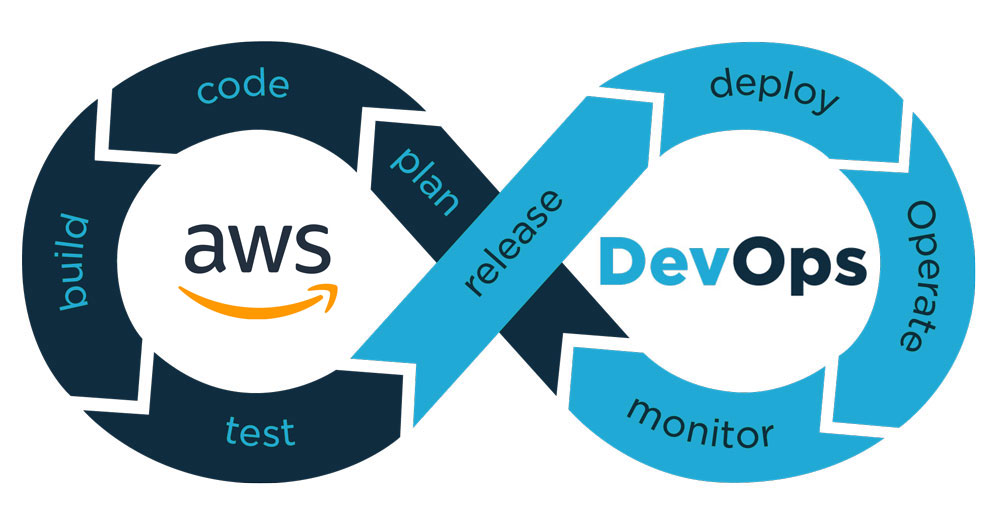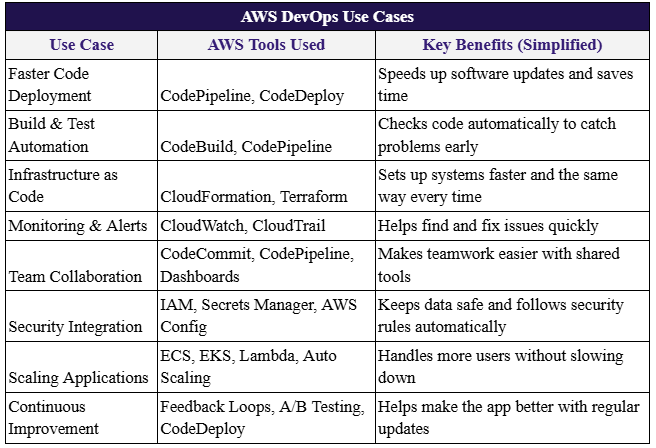
06 Jun 2025
Top Use Cases of AWS DevOps for Faster Software Delivery
AWS DevOps combines development and operations teams using cloud tools and automation to speed up software delivery. Tools like CodePipeline, CodeBuild, and CodeDeploy help automate building, testing, and deploying software, saving time and reducing errors. AWS CloudFormation manages infrastructure automatically, while CloudWatch monitors applications in real time to quickly fix issues. This approach enables faster, reliable, and scalable deployments, making it easy to update or roll back software. AWS DevOps also supports continuous improvement by automating feedback and testing, helping teams deliver new features quickly. It improves team collaboration through shared tools and responsibilities, boosting efficiency. Security is built into every stage using services like IAM and Secrets Manager, ensuring data protection and compliance. AWS DevOps scales applications automatically with services like ECS and Lambda, providing a smooth user experience. Learn more with Cokonet Academy’s expert AWS DevOps courses.
AWS DevOps brings together development and operations teams by using cloud tools and automation. This helps teams work better together, from writing code to deploying it. Instead of working in separate silos, developers and operations can now collaborate smoothly using AWS services like CodePipeline, CodeBuild and CodeDeploy. These tools can help to automate the process of building, testing, and releasing the software, saving time and reducing errors.
With AWS CloudFormation, teams can also manage the infrastructure automatically. CloudWatch helps monitor the applications and systems in real time, so problems can be fixed very quickly. This combination of tools can help companies deliver better software and more faster.
Enabling Faster, Reliable, and Scalable Deployments
By using AWS DevOps, teams can deploy software faster and more consistently. They can roll out the updates to different environments easily and roll them back safely if needed. This is mostly useful for many types of projects, like launching websites, managing microservices or building serverless apps with AWS Lambda.
AWS DevOps also helps with tasks like automating security checks, monitoring the performance and scaling systems on a global level. No matter the size of the company, these tools can help teams stay agile, reduce downtime and deliver a better experience to users. As businesses grow, AWS DevOps becomes a more key part of keeping software delivery fast, smooth, and secure.
Driving Innovation Through Continuous Improvement
One of the biggest strengths of AWS DevOps is its support for continuous improvement. Because processes are automated and monitored, teams can learn from each release and make improvements quickly. Feedback loops are faster, bugs are caught earlier, and new features can be delivered more frequently. This not only boosts productivity but also improves customer satisfaction, as users get updates and improvements without long delays. In fast-paced industries, staying competitive means being able to adapt and evolve. With AWS DevOps, companies can experiment, test and deploy new ideas quickly, turning innovation into a daily routine rather than a rare event. Improving Collaboration and Team Efficiency
AWS DevOps doesn’t just improve technology; it transforms how teams work together. By sharing tools, visibility and responsibilities, development and operations teams become more aligned. Developers can see how their code performs in production, and operations teams can contribute earlier in the development process.
This shared ownership leads to faster problem-solving, fewer misunderstandings, and a stronger focus on the end goal. Delivering quality software quickly and reliably. With tools like shared dashboards, automated alerts, and version control systems, everyone stays on the same page, which boosts team morale and overall efficiency.
Boosting Security and Compliance in Every Stage
Security is a key concern in any software development process, and AWS DevOps makes it easier to build security into every stage of the pipeline. Instead of waiting until the end to perform security checks, DevOps encourages a “shift-left” approach, embedding security earlier in development.
With tools like AWS Identity and Access Management (IAM), Secrets Manager and AWS Config, teams can control who has access to what, manage sensitive data securely, and ensure systems meet compliance standards. Automated security scans, policy checks and real-time monitoring help catch issues before they become risks.
This proactive strategy improves overall security without slowing down the pace of development, helping teams stay agile while staying protected.
Scaling Applications Seamlessly with AWS DevOps
As businesses grow, their applications need to handle more users, data, and transactions. AWS DevOps makes scaling easy and efficient by using cloud services that adjust automatically based on demand. Services like Amazon Elastic Container Service (ECS), Elastic Kubernetes Service (EKS) and AWS Lambda allow teams to deploy applications that scale up or down without manual intervention.
Automation tools help easily manage infrastructure changes quickly, ensuring performance remains steady even during traffic spikes. This flexibility means companies can provide a smooth user experience, avoid downtime, and reduce costs by only using resources when needed.

If you are searching for the best place to learn AWS DevOps, look no further than Cokonet Academy. They offer comprehensive courses designed to help you master AWS tools and DevOps practices so you can boost your career and deliver software faster.
1. What is AWS DevOps?
AWS DevOps uses Amazon Web Services and DevOps methods to help teams build and deliver software faster and more smoothly.
2. How does AWS DevOps improve software delivery?
It automates building, testing, and releasing software, which saves time and reduces mistakes.
3. Which AWS tools are used for DevOps?
Popular tools include CodePipeline (automation), CodeBuild (build and test), CodeDeploy (deployment), CloudFormation (infrastructure), and CloudWatch (monitoring).
4. What is Infrastructure as Code (IaC) in AWS?
IaC means managing cloud resources using code, so setups are easy to repeat and keep consistent.
5. How does AWS DevOps help with security?
Security is built in early using tools like IAM and Secrets Manager to keep data safe and meet rules.
6. Can AWS DevOps scale applications?
Yes, services like ECS, EKS, and Lambda automatically adjust resources to handle more users when needed.
7. What is continuous integration and continuous delivery (CI/CD)?
CI/CD is an automated process that helps developers quickly update and deliver software safely.
8. How does AWS DevOps improve team collaboration?
Shared tools and alerts help developers and operations teams work closely and solve problems faster.
9. What monitoring tools does AWS DevOps use?
CloudWatch and CloudTrail watch applications and alert teams to fix problems quickly.
10. Why choose Cokonet Academy for AWS DevOps training?
Cokonet offers hands-on courses to learn AWS DevOps skills and boost your career growth.

